Beyond bluster, U.S., N. Korea in regular contact
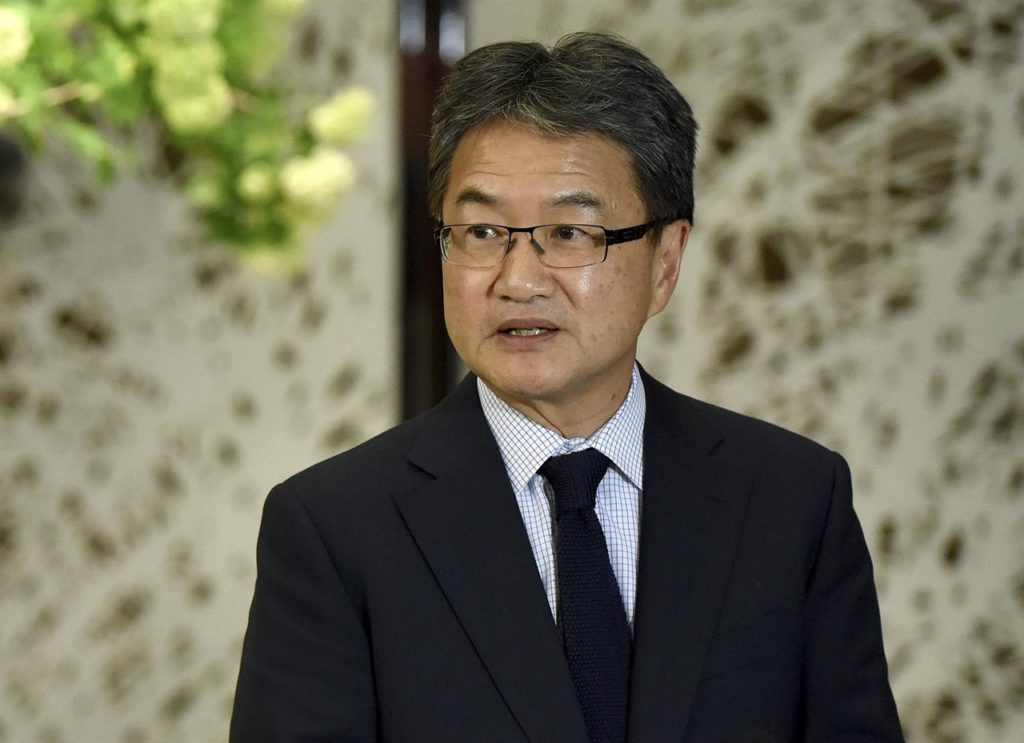
Beyond the bluster, the Trump administration has been quietly engaged in back channel diplomacy with North Korea for several months, addressing Americans imprisoned in the communist country and deteriorating relations between the longtime foes, The Associated Press has learned. It had been known the two sides had discussions to secure the June release of an American university student. But it wasn’t known until now that the contacts have continued, or that they have broached matters other than U.S. detainees. People familiar with the contacts say the interactions have done nothing thus far to quell tensions over North Korea’s nuclear weapons and missile advances, which are now fueling fears of military confrontation. But they say the behind-the-scenes discussions could still be a foundation for more serious negotiation, including on North Korea’s nuclear weapons, should President Donald Trump and North Korean leader Kim Jong Un put aside the bellicose rhetoric of recent days and endorse a dialogue. Trump refused to discuss the diplomatic contacts. “We don’t want to talk about progress, we don’t want to talk about back channels,” Trump told reporters Friday. The diplomatic contacts are occurring regularly between Joseph Yun, the U.S. envoy for North Korea policy, and Pak Song Il, a senior North Korean diplomat at the country’s U.N. mission, according to U.S. officials and others briefed on the process. They weren’t authorized to discuss the confidential exchanges and spoke on condition of anonymity. Officials call it the “New York channel.” Yun is the only U.S. diplomat in contact with any North Korean counterpart. The communications largely serve as a way to exchange messages, allowing Washington and Pyongyang to relay information. Drowned out by the furor over Trump’s warning to North Korea of “fire and fury like the world has never seen,” Secretary of State Rex Tillerson has expressed a willingness to entertain negotiations. His condition: Pyongyang stopping tests of missiles that can now potentially reach the U.S. mainland. Tillerson has even hinted at an ongoing back channel. “We have other means of communication open to them, to certainly hear from them if they have a desire to want to talk,” he said at an Asian security meeting in the Philippines this week. The interactions could point to a level of pragmatism in the Trump administration’s approach to the North Korean threat, despite the president’s dire warnings. On Friday, he tweeted: “Military solutions are now fully in place, locked and loaded, should North Korea act unwisely.” But on Thursday, he said, “we’ll always consider negotiations,” even if they haven’t worked in the last quarter-century. The contacts suggest Pyongyang, too, may be open to a negotiation even as it talks of launching missiles near the U.S. territory of Guam. The North regularly threatens nuclear strikes on the United States and its allies. The State Department and the White House declined to comment on Yun’s diplomacy. A diplomat at North Korea’s U.N. mission only confirmed use of diplomatic channel up to the release of U.S. college student Otto Warmbier two months ago. Trump, in some ways, has been more flexible in his approach to North Korea than President Barack Obama. While variations of the New York channel have been used on-and-off for years by past administrations, there were no discussions over the last seven months of Obama’s presidency after Pyongyang broke them off in anger over U.S. sanctions imposed on its leader, Kim. Obama made little effort to reopen lines of communication. The contacts quickly restarted after Trump’s inauguration, other people familiar with the discussions say. “Contrary to the public vitriol of the moment, the North Koreans were willing to reopen the New York channel following the election of President Trump and his administration signaled an openness to engage and ‘talk about talks,’” said Keith Luse, executive director of the National Committee on North Korea, a U.S.-based group that promotes U.S.-North Korean engagement. “However, the massive trust deficit in Pyongyang and in Washington toward each other has impeded the confidence-building process necessary to have constructive dialogue,” he said. The early U.S. focus was on securing the release of several Americans held in North Korea. They included Warmbier, who was imprisoned for stealing a propaganda poster and only allowed to return to the U.S. in June — in an unconscious state. He died days later. Yun traveled on the widely publicized mission to Pyongyang to bring Warmbier home. Despite outrage in the U.S. with Warmbier’s treatment and sharp condemnation by Trump, the U.S.-North Korean interactions in New York continued. Yun and his counterpart have discussed the other Americans still being held. They include Kim Hak Song, a university employee detained in May accused of unspecified “hostile” acts; Tony Kim, a teacher at the same school, accused of trying to overthrow the government; and Kim Dong Chul, sentenced last year to a decade in prison with hard labor for supposed espionage. But the American and North Korean diplomats also have discussed the overall U.S.-North Korean relationship. The two countries have no diplomatic ties and are still enemies, having only reached an armistice — not a peace treaty — to end the 1950-1953 Korean War. Twenty-eight thousand U.S. troops are still stationed in South Korea. In its own convoluted way, North Korea has indicated openness to talks in recent weeks, even as it has accelerated the tempo of weapons tests. On July 4, after the North test-launched an intercontinental ballistic missile that could potentially strike the continental U.S., leader Kim added a new caveat to his refusal to negotiate over its nukes or missiles. Instead of a blanket rejection, he ruled out such concessions “unless the U.S. hostile policy and nuclear threat to the DPRK are definitely terminated.” That message has been repeated by other North Korean officials, without greater specification. Nor have they offered an indication as to whether Pyongyang would accept denuclearization as the goal of talks. Still, advocates for diplomacy, including some voices in the U.S. government, view the addendum as a potential opening. “North Korea is assessing its options,”
Duck Dynasty’s Phil Robertson endorses Roy Moore for Senate
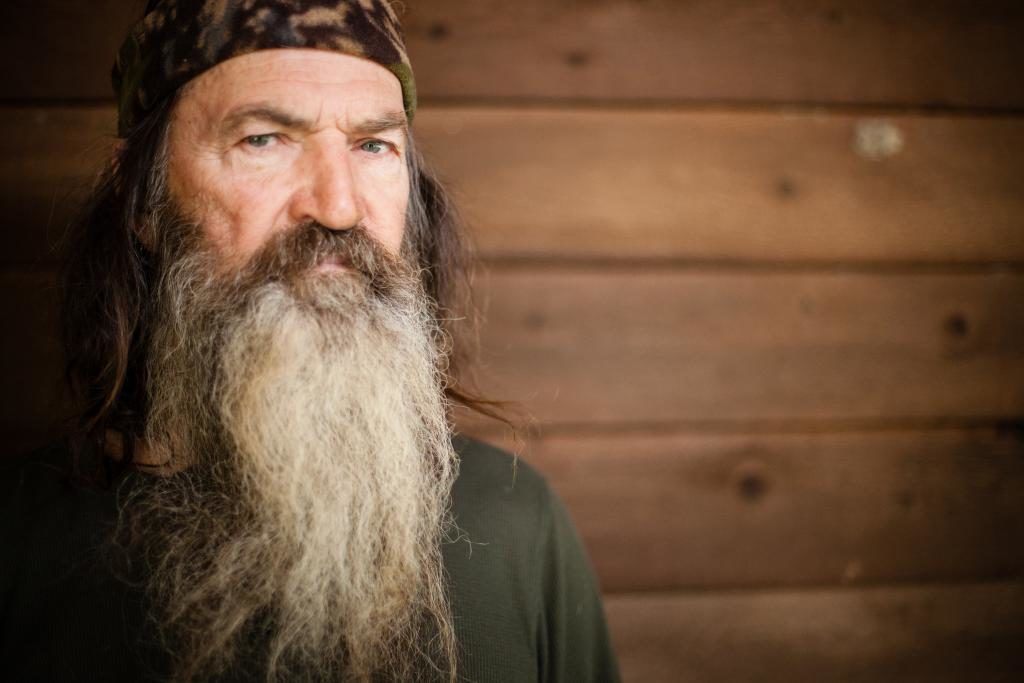
First, it was Chuck Norris; now Phil Robertson, star of Duck Dynasty cable series, is endorsing former Alabama Supreme Court Chief Justice Roy Moore in his bid for U.S. Senate. Moore’s campaign announced the endorsement Thursday. “I have been an admirer for some time of Judge Roy Moore,” Robertson said in a statement. “He judged with a good understanding of the Constitution and the law, but he also understands natural law and who gave us our rights to begin with, Almighty God.” “I thank Phil for his support and prayers,” Moore responded. “The Robertsons are a great example for the American family. They represent hard work, Christian values, and conservative principles, which is what we need to make our nation great again, and to make our nation good again.” Recent polling gives Moore a 31-23 lead over sitting U.S. Sen. Luther Strange, with U.S. Rep. Mo Brooks with 18 percent. Other polling gave state Sen. Trip Pittman with 8 percent and Alabama Christian Coalition president Randy Brinson with 2 percent. Eleven percent are undecided. Other Republican candidates include Dr. James Beretta, Joseph Breault, Mary Maxwell and Bryan Peeples. As for Democrats, polling gives Robert Kennedy, Jr. a lead in the 7-person field with 49 percent; former U.S. Attorney Doug Jones had 28 percent. The remaining field took only single digits. Unless one of the candidates can secure a 50 percent plus one majority of the vote in the Aug. 15 primary, Alabama voters will have to decide between the top two vote-getters in a Sept. 26 runoff. The general election is Dec. 12.
Joe Biden gives thumbs-up to Doug Jones in Alabama U.S. Senate primary
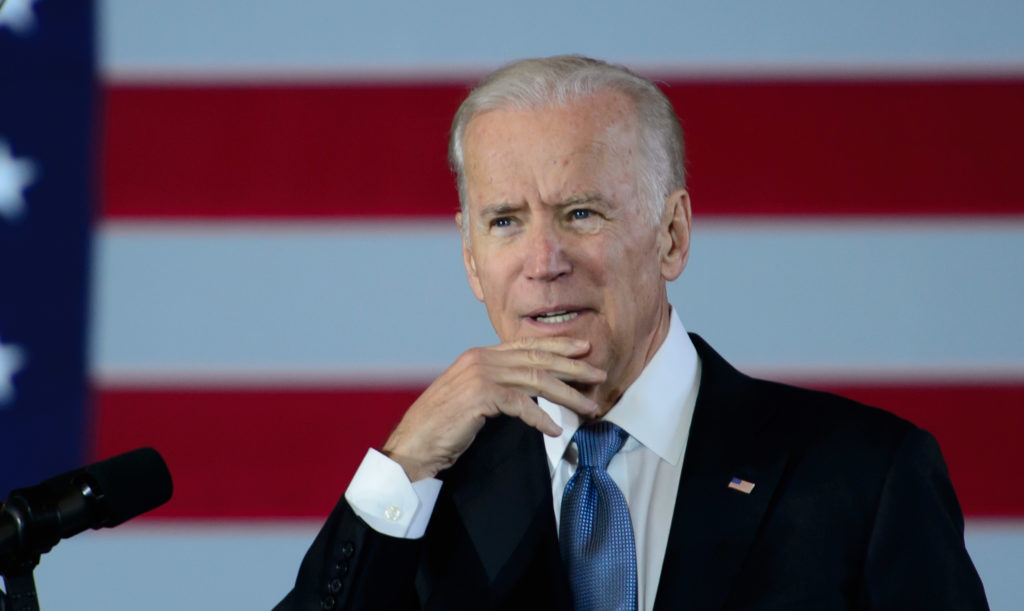
Former Vice President Joe Biden gave thumbs-up to former federal prosecutor Doug Jones in his bid for the Democratic nomination for Alabama’s U.S. Senate seat. Al.com reports that Biden is featured in a robocall Thursday urging voters to cast ballots for Jones in Tuesday’s special primary to decide who will finish the term of Attorney General Jeff Sessions. Jones’ campaign published the text of Biden’s robocall on Facebook: “Doug has spent his entire life fighting for justice. He was the man after the 1963 church bombings that would not let it rest until he found the killers of those four young girls — and he eventually found justice — prosecuting and jailing those Klansmen nearly 40 years later. He’ll take that same energy and drive and fight for you and your families in the Senate — for a higher minimum wage, for fair, affordable health care, for good schools for all our kids. Doug Jones will make a great U.S. Senator so please make sure you get out and vote on Tuesday — and I’m hoping you’ll vote for my friend, Doug Jones.” With Biden taking sides, both Obama and Trump administrations have weighed in on the Alabama U.S. Senate election. Donald Trump tweeted his support for sitting Sen. Luther Strange this week. Also supporting Jones is Georgia Democratic Rep. John Lewis and Rep. Terri Sewell of Birmingham. In a Raycom poll conducted last month, Robert Kennedy Jr. — no relation to the famous Kennedy family — is leading the Democratic race with 49 percent, compared to 28 percent for Jones. Jones and Kennedy are part of an eight-person field that includes Will Boyd, Vann Caldwell, Jason Fisher, Michael Hansen, Brian McGee and Charles Nana. Unless one of the candidates can secure a 50 percent plus one majority of the vote in the Aug. 15 primary, Alabama voters will have to decide between the top two vote-getters in a Sept. 26 runoff. The general election is Dec. 12.
Donald Trump blasts Mitch McConnell, Alabama Senate candidates slow to defend
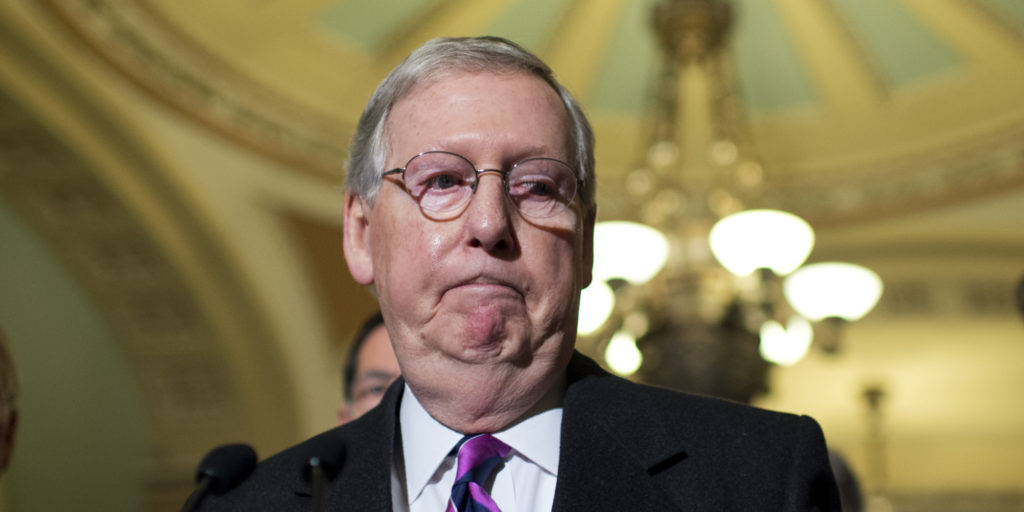
While President Donald Trump hammers Kentucky Sen. Mitch McConnell over the lack forward movement on his Republican agenda, candidates in Alabama’s U.S. Senate primary are just a slow to defend the majority leader. POLITICO reports that Huntsville Republican Rep. Mo Brooks, in an interview Thursday, found it “baffling” Trump is endorsing sitting Sen. Luther Strange, a move that he said would “ensure nothing will get done.” Brooks had “no question” Trump’s criticism of McConnell was justified, telling the interviewer: “Mitch McConnell, if he’s not gonna get the job done, needs to resign so someone else can try to get the job done.” Strange, who is considered the Republican establishment candidate, also echoed Trump’s comment for “Mitch, get back to work.” “We all need to get back to work,” Strange said in Homewood this week after a county Republican Party meeting. “I was part of the group of Republican senators who said we shouldn’t even take a vacation. I don’t know why we’re taking a vacation. We should be working to pass the president’s agenda and deal with the problems we failed to address last time.” Strange later admitted “he’s frustrated like I am, and this is no secret,” but stop short of suggesting the Senate GOP leadership needed to change. “We all talked about it,” Strange added. “Said, if we failed to do what’s promised, we’re going to look silly and rightfully be criticized. And so, I have no problem with the president saying that at all.” McConnell has been a major figure in Alabama’s Republican Senate primary, mostly through the Senate leadership fund, super PAC with ties to the majority leader. Strange supporters have been blasting Brooks with a series of negative ads, as well as recently turning attention to Supreme Court Chief Justice Roy Moore, who has been leading in the polls by as much as eight points. Nevertheless, McConnell has been weathering attacks from the president on Twitter, expressing frustration with McConnell and the Senate GOP’s failure to make headway in repealing Obamacare last month. “I’ll tell you what: If he doesn’t get repeal-and-replace done, and if he doesn’t get taxes done, meaning cuts and reform, and if he doesn’t get a very easy one to get done, infrastructure, he doesn’t get them done, then you can ask me that question,” Trump said during his 17-day vacation in Bedminster, New Jersey. McConnell responded through a representative: “The leader has spoken repeatedly about the path forward regarding Obamacare repeal-and-replace on the Senate floor, at media availabilities and in Kentucky.” As for Moore, the candidate is trying to stay above the fray between Trump and McConnell, saying the fight is “between them.” But the former justice has not expressed an affinity for the Kentucky Republican. “I’m not going to say anything good about Mitch McConnell, who’s running the fund that’s attacking me with ads. Now, I won’t do that,” Moore told POLITICO recently. “But I won’t say anything bad out him … I won’t judge that. That’s between them.” Unless one of the candidates can secure a 50 percent plus one majority of the vote in Tuesday’s primary, Alabama voters will have to decide between the top two vote-getters in a Sept. 26 runoff. The general election is Dec. 12.
New polling gives Roy Moore 8-point lead in Senate primary, leading runoff
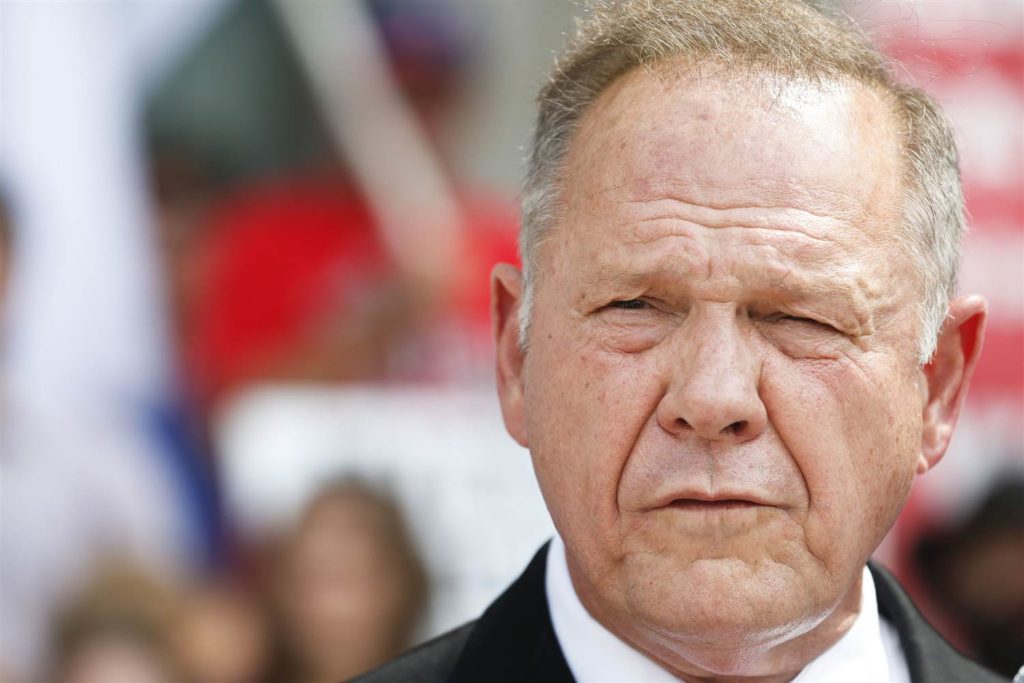
Former state Supreme Court Chief Justice Roy Moore is opening a lead in the Alabama U.S. Senate Republican primary, and is the favorite in a potential runoff. The Hill is reporting on a Cygnal/L2 poll released Thursday, ahead of next week’s primary, suggests the race will go to a runoff between the top two vote-getters without one getting a majority of the vote. This makes second place crucial. Moore leads the field with 31 percent compared to sitting Sen. Luther Strange‘s 23 percent. Huntsville Republican Congressman Mo Brooks, the only other candidate with a chance of making the runoff, follows with 18 percent. Strange’s lead over Brooks is just outside the +/- 4.4 percent margin of error. Cygnal/L2 polled 502 likely Alabama Republican primary voters. These numbers indicate a three-way race for who will serve the rest of Attorney General Jeff Sessions’ term. As Alabama’s former Attorney General, Strange was appointed to the seat in February by then-Gov. Robert Bentley, until the state holds a special election in December. With a state as red as Alabama, the primary winner is likely to take the seat. “I expect Moore and Strange in the runoff election, but Strange hasn’t locked down the second spot yet,” Cygnal’s president Brent Buchanan said in a polling statement. “It will be interesting to see if President Trump’s endorsement of Senator Strange increases voter turnout, which should favor Strange according to our survey results.” With the runoff, polling found Moore would lead Strange 45 to 34 percent in a hypothetical matchup. The survey did not include Brooks. Brooks’s favorability rating is also underwater, with 39 percent of likely Republican primary voters view him favorably, and 46 percent saw him unfavorably. Strange’s favorable numbers are +4 points, 46 to 42 percent. Moore sits best, with a 56 percent positive rating. Unless one of the candidates can secure a 50 percent plus one majority of the vote in Tuesday’s primary, Alabama voters will have to decide between the top two vote-getters in a Sept. 26 runoff. The general election is Dec. 12.
Luther Strange rolls out new ads touting Donald Trump endorsement
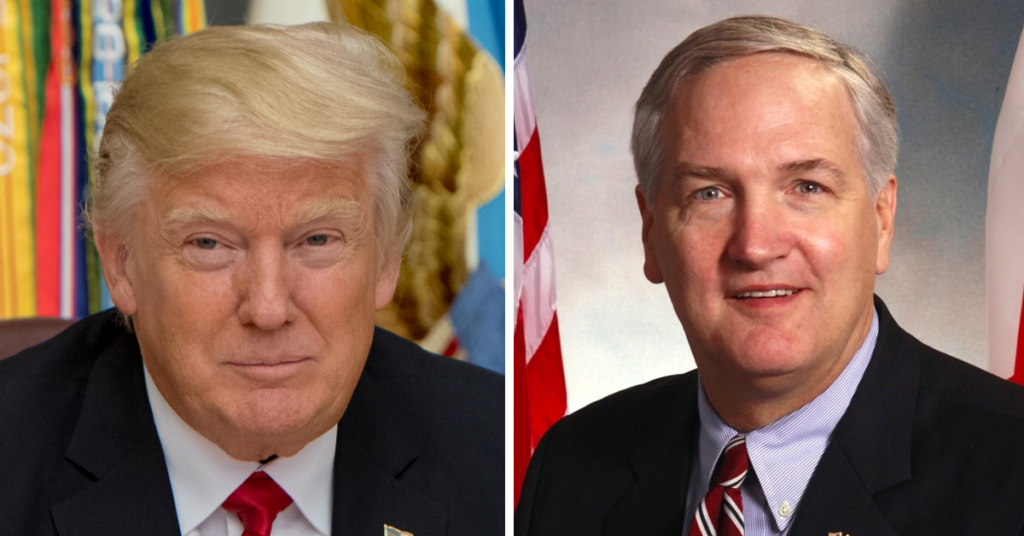
As the clock winds down on Alabama’s Republican U.S. Senate primary, sitting Sen. Luther Strange’s campaign rolled out a late ad campaign touting President Donald Trump‘s Twitter endorsement. POLITICO reports the ads launched Thursday morning, only days before the special Senate primary to decide who will complete Attorney General Jeff Sessions’ Senate term. “President Trump says Luther Strange is the best conservative to pass our agenda,” says the narrator in “Trump Man,” Strange’s new 30-second spot as Trump’s tweet is shown in the background. “Tweeting, ‘Luther Strange has done a great job representing the great people of the great state of Alabama. He has my complete and total endorsement!’” An accompanying radio ad focuses on Mo Brooks, one of Strange’s leading primary rivals. “Brooks keeps attacking our president,” says the radio narrator, playing a clip of Brooks saying: “I don’t think you can trust Donald Trump with anything he says.” Strange and Brooks have been trading digs in the heated midsummer 9-person primary battle, which includes former Alabama Supreme Court Chief Justice Roy Moore. Recent polling gives Moore a slight 31-29 lead over Strange – a statistical tie within the margin of error. The same poll showed Brooks with 18 percent support, followed by state Sen. Trip Pittman with 8 percent and Alabama Christian Coalition president Randy Brinson with 2 percent. Eleven percent were undecided. Other Republican candidates include Dr. James Beretta, Joseph Breault, Mary Maxwell and Bryan Peeples. As for Democrats, polling gives Robert Kennedy, Jr. a lead in the 7-person field with 49 percent; former U.S. Attorney Doug Jones had 28 percent. The remaining field took only single digits. Unless one of the candidates can secure a 50 percent plus one majority of the vote in the Aug. 15 primary, Alabama voters will have to decide between the top two vote-getters in a Sept. 26 runoff. The general election is Dec. 12.
Mo Brooks’ history of questionable ethics as Madison County DA
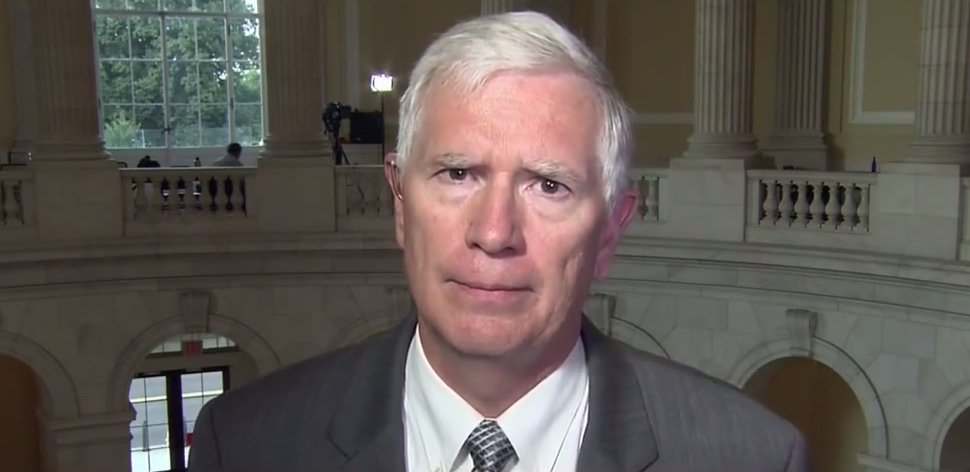
When Hoover Republican Dom Gentile dropped out of Alabama’s U.S. Senate primary, he promptly endorsed Rep. Mo Brooks. “It’s very rare to have a politician who is very smart, who is selfless and who does the right things,” Gentile said in July. “A good man, a family man, who’s never had an ethics complaint.” A slightly deeper dive into the past of the man who wants to be Alabama’s U.S. Senator proves maybe Gentile should have never said “never.” As with many things with Brooks, the truth – particularly about ethics — is not so cut-and-dry. In October 1992, the Huntsville Times wrote a series of pieces profiling Brooks, who was serving as Madison County district attorney at the time. Mostly written by reporter John Anderson, the Times series suggests there were several instances of questionable ethics by Brooks, including choosing jurors based on ZIP codes, pressuring colleagues for support, rainy day funds and mixing politics with his job. “Fairly or unfairly, Brooks began the district attorney’s job with a reputation as a political animal — a reputation he’s yet to live down,” Anderson wrote. “One story making the rounds at the Courthouse has it that Brooks, while trying a drug case … chose jurors based in part on their ZIP codes with the expectation that jurors from his former House district would help him win a conviction. “ During the same period, Linda Coats, Brooks’ former assistant DA, had accused Brooks of demanding “that his staff take sides in his [District Attorney] race.” “He would say that the office is divided into `Mo-ites’ and `Morganites’ [referring to Democratic opponent Tom Morgan]. He told me I was a `Mo-ite’” Coats told the Times. “He said that people who stand in the middle of the road and remain neutral are going to get hit by both sides.’” Coats originally supported Brooks – who quickly earned a reputation for playing “hard ball” — but soon became resentful of attempts to ‘manipulate’ her into supporting him, feeling that she would not have a job if he did not win the general election. Brooks chalked Coates’ claims to her being miserable “because she had no friends in the D.A.’s office.” Nevertheless, both Coats and another assistant DA, William Davis Lawley Jr., resigned in Sept. 1992, saying they could “no longer work for Brooks.” In leaving, Lawley noted that he “didn’t like the priorities down there.” By then, however, more stories of dubious ethics were coming out of the office of the man who would later serve four terms in the U.S. House: Mixing politics with work through tactics such as handing out campaign literature to grand jurors during in proceedings. One grand jury member, who asked not to be identified, told the Times that Brooks’ campaigning among grand jurors “leans toward the unethical because we were there to work. He had a captive audience and I think that was unfair.’” In 1992, Brooks would indeed lose that first bid for Madison County district attorney (he was appointed in 1991) to Morgan. But before his successor could take office, the Huntsville Times learned that Brooks offered each of his attorneys and two other state employees a parting gift: A $3,000 raise just before Christmas. When Huntsville Times reporter Patricia Dedrick asked Brooks if the raises were a “final jab” at Morgan, he replied: “Oh, Lord, no.” But Dedrick also wrote: “Morgan is ‘going to have so much money he’s going to have a hard time spending it,’ [Brooks] said. Money for the raises, which amounts to $51,000 a year, will come in part from an office ‘rainy day’ fund totaling more than $200,000.” In addition, Morgan noted that such raises were certainly not typical: “I have never gotten $3,000, I don’t think anybody ever got that kind of raise. $1,500 and $2,000 is the most anybody has ever gotten.” While these episodes may be buried in the past — pressuring colleagues, offering big raises, mixing work and politics – they still raise just enough questions for someone seeking to be Alabama’s next U.S. Senator.
Kay Ivey elevates two acting cabinet agency heads to permanent roles at ALEA, Conservation Dept.
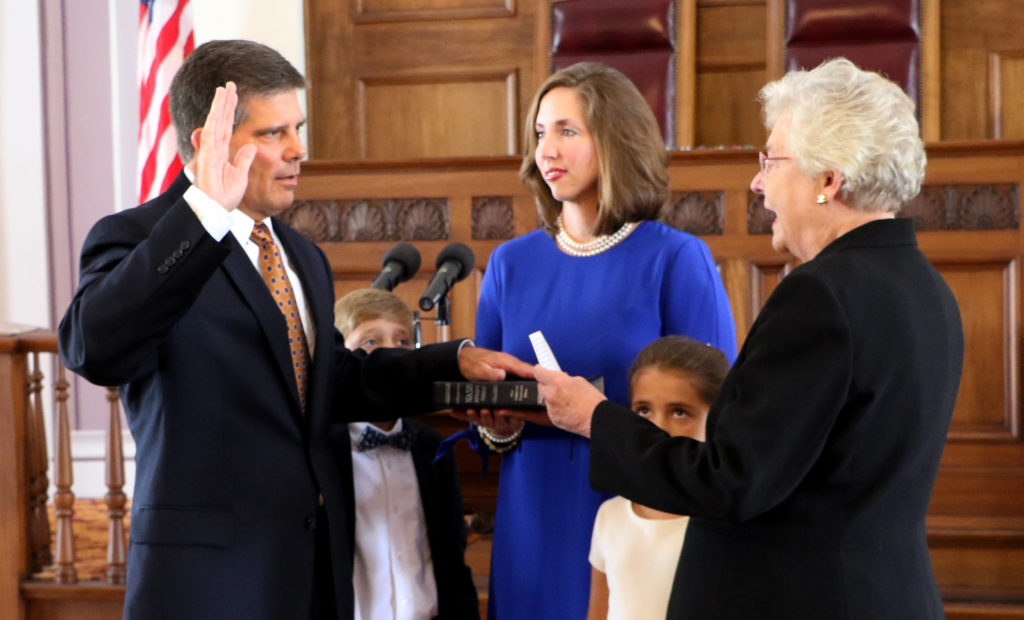
Governor Kay Ivey on Friday announced she has elevated Hal Taylor and Chris Blankenship from their roles as acting cabinet agency heads to permanent roles. Taylor is the permanent Secretary of the Alabama Law Enforcement Agency (ALEA), and Blankenship is now the permanent Commissioner of the Department of Conservation and Natural Resources. “Since I appointed Chris Blankenship as Acting Conservation Commissioner and Hal Taylor as Acting ALEA Secretary, both men have proven beyond any doubt their abilities to effectively lead their respective agencies,” Ivey said in a news release. “I am proud to appoint both men to serve permanently in their particular roles.” Taylor had been acting secretary of ALEA since April 12, when he replaced Stan Stabler, a Bentley-era appointee who Ivey required to resign upon taking office. Prior to that he served as the Deputy Chief of Staff for the State Bureau of Investigations and ALEA Chief of Staff beginning in 2014. Before that, Taylor worked for the ABC Board going back to 1992. There he held multiple positions, including executive security and Assistant Director of the Enforcement Division. “Alabama’s law enforcement efforts must be handled with precision and integrity; Hal Taylor’s leadership ensures that happens. Hal is ably leading the men and women who serve our state as part of the Alabama Law Enforcement Agency, and I am thankful for his continued efforts,” Ivey commented. Blakenship was appointed as Acting Conservation Commissioner a little over two months ago on June 1. Before that, he served as the Deputy Commissioner and as Director of DCNR Marine Resources Division from 2011 to 2017. He has worked at the Department of Conservation and Natural Resources since 1994 when he was hired as a Conservation Enforcement Officer. “From effectively working to extend the Red Snapper season, to protecting Alabama’s natural resources, Chris Blankenship has made it clear he can lead the Department of Conservation and Natural Resources long-term,” Ivey added. “I am proud to have Chris as part of my team.” Both Blankenship and Taylor were officially sworn in on Friday morning in a private ceremony at the State Capitol in Montgomery.
Gary Palmer to host August town hall meetings in Calera, Hueytown

Many Members of Congress have shied away from town hall meetings altogether in 2017, but not Alabama 6th District U.S. Rep. Gary Palmer. For the third time this year, the two-term congressman, and member of the conservative House Freedom Caucus, is hosting a series of town hall events in an effort to hear directly from residents of Alabama’s 6th Congressional District, Palmer announced Wednesday he will hold two town hall meetings next week. “The August work period is upon us and I am happy to be back home meeting with constituents all across the Sixth District. I am hosting two town halls next week in Calera and Hueytown, and I would like to invite you to join in on the conversation at one of them,” Palmer said in a Wednesday email to his constituents. Palmer said attendees will have the opportunity to discuss the important issues facing Congress and ask questions. Details about the town hall meetings can be found below: Calera Town Hall Tuesday, August 15 – 6:30 p.m. Calera City Hall 7901 Highway 31 Calera, AL 35040 Hueytown Town Hall Thursday, August 17 – 6:30 p.m. North Highlands Baptist Church 4851 15th Street Rd Hueytown, AL 35023 Both town halls are free and open to the public. They will be streamed live on the Congressman’s Facebook page for those unable to attend.
Kay Ivey awards grant to help former inmates get back to work

Felons find themselves in a tough position when they’re finally released prison: they need a job to get back on their feet, but with their criminal record and lack of experience, they’re usually not on the top of the list for a call-back from a potential employer. Which is exactly what Alabama Gov. Kay Ivey hopes to change. On Wednesday, Ivey awarded a $130,870 grant to help former inmates obtain work skills necessary to help them transition back into society and become productive citizens. The grant will provide funds for the Cut Above the Rest program to continue training ex-offenders and other hard-to-place workers for skills in the construction industry. Funds are being directed to the city of Montgomery which administers the program. “Alabama inmates who have completed their sentences or have been paroled should have the opportunity to merge back into society as law-abiding individuals who want to earn an honest living,” Ivey said. “I commend the city of Montgomery and the Cut Above the Rest training program for recognizing this need and providing this service.” The funds will enable the Montgomery-based program to offer live-stream training to locations in Birmingham and Mobile and provide additional resources for more students. During the six-week training, students are given instruction in job safety, construction tools, construction math, operation of heavy equipment and basic employee skills. The co-educational program also helps to place students with employers once they have completed the program. Since its beginning in 2014, more than 100 students have completed the course and 93 went on to take construction jobs. The Alabama Department of Economic and Community Affairs (ADECA) is administering the grant from funds made available by the U.S. Department of Justice. “This program meets Gov. Ivey’s goals of reducing the prison population and helping Alabamians obtain jobs,” ADECA Director Kenneth Boswell said. “ADECA is pleased to be a partner in this cooperative process.”
Donald Trump warns North Korea: U.S. military ‘locked and loaded’
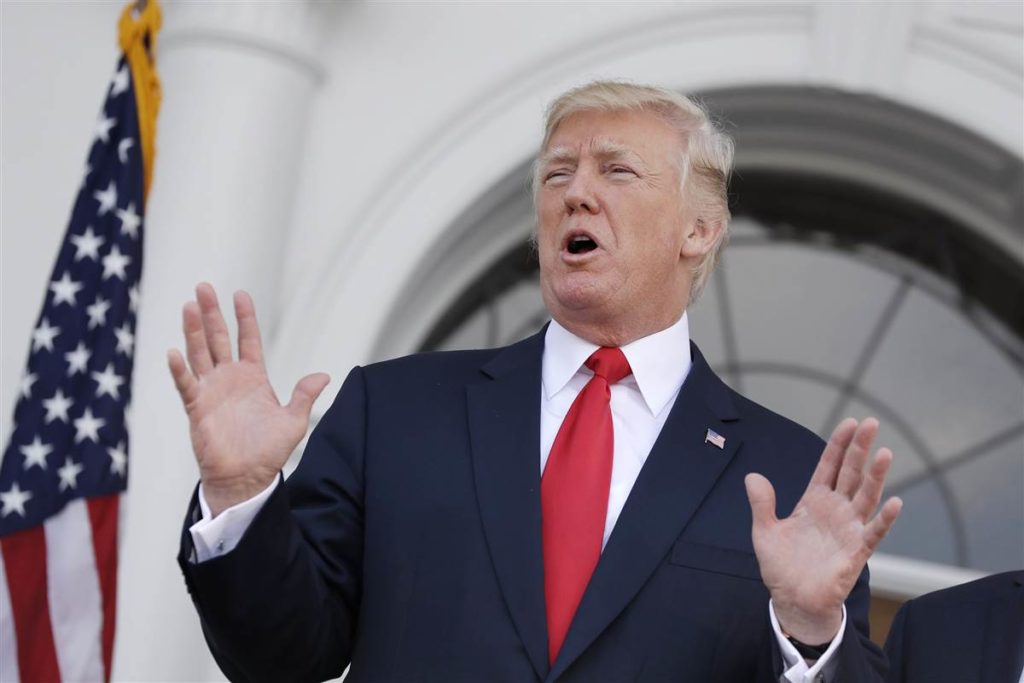
President Donald Trump is warning of military action, saying the U.S. is “locked and loaded, should North Korea act unwisely.” Trump tweeted: “Military solutions are now fully in place, locked and loaded, should North Korea act unwisely. “ North Korea has announced a detailed plan to launch a salvo of ballistic missiles toward the U.S. Pacific territory of Guam, a major military hub and home to U.S. bombers. If carried out, it would be its most provocative missile launch to date. Trump said this week the U.S. would unleash “fire and fury” on North Korea if it continued to threaten the U.S. The tweet was one of several Trump sent Friday. He also retweeted links to Fox News stories on Trump’s frustration with Senate Republicans and drone strikes in Somalia. Republished with permission of The Associated Press.
North Alabama judge rules state law banning teacher-student sex is unconstitutional

A Morgan County Circuit Court Judge has ruled the Alabama Law that criminalizes high school teachers having sex with students is unconstitutional, and dismissed charges in two cases. In a five-page decision, Judge Glenn E. Thompson dismissed the charges against former Decatur High School teacher Carrie Witt and an ex-aide at Falkville High, David Solomon. Witt, 44, was accused of having sex with two students, ages 17 and 18. Solomon, 27, was accused of having sex with a 17-year-old student. “The Court finds this statute unconstitutional as applied to these defendants,” wrote Thompson in the order. “In finding so, this court does not endeavor to absolve any wrongdoing or to excuse the defendants. Moreover, the court does not encourage any similarly situated party to engage with impunity in what may very well be criminal behavior.” In Alabama the age of consent is 16, and state law prohibits school employees from having sex with students under 19. Violators could be charged with a Class B felony, carrying a punishment of up to 20 years behind bars. Defense attorneys argued the law is too broad and that it violates teachers’ equal protection right under the 14th Amendment, treating teachers and other school employees differently than other Alabamians. Thompson said the law embeds an “irrebuttable presumption” that any sexual encounter between an employee of any school and any student in the state is the result of a misuse of authority. “It is this court’s finding that the law grants these students the capacity to consent until and unless there is some showing that authority was used to obtain illegitimate or coerced consent,” Thompson wrote. “If no such position of authority is alleged, the defendant must be permitted to show consent as a defense.”


